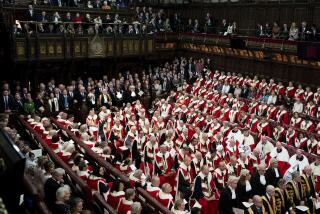Noble Endeavor
- Share via
Britain’s House of Lords swallowed its qualms and went public Wednesday. For the first time, with predictions of disaster still rumbling through London, television cameras covered the comings and goings--but not the catnaps--of as many of the empire’s 936 noblemen as could squeeze into the stately upper chamber at Westminster.
“This blessed plot, this earth, this realm, this England” did not sink into the silver sea. Nor did the pound sink further--at least not as a direct result. The camera lenses obeyed the rules and remained rooted on the speakers so that the dozers had as much privacy as you can get in a crowded hall. There was no more showboating than you would expect from any titled parliamentarian with a firm grip on the Queen’s English. Nothing terrible happened. All that happened, in fact, was that Britons could see an important part of their government in motion and in living color--an experience that is difficult to re-create in a textbook or a political-science lecture.
The interesting thing about the Westminster episode is that the body of lawgivers who are not elected by anyone but are appointed by monarchs decided to put government in full view of its people while the elected lawmakers of the U.S. Senate were still arguing about whether it was proper.
There is no way in which the senators can avoid history’s noting that a group of noblemen beat them to the recognition that democracy is a sturdy enough form of government to let people in on what the government is doing. But they can, and should, make sure that the House of Lords did not beat them by much.
More to Read
Sign up for Essential California
The most important California stories and recommendations in your inbox every morning.
You may occasionally receive promotional content from the Los Angeles Times.









